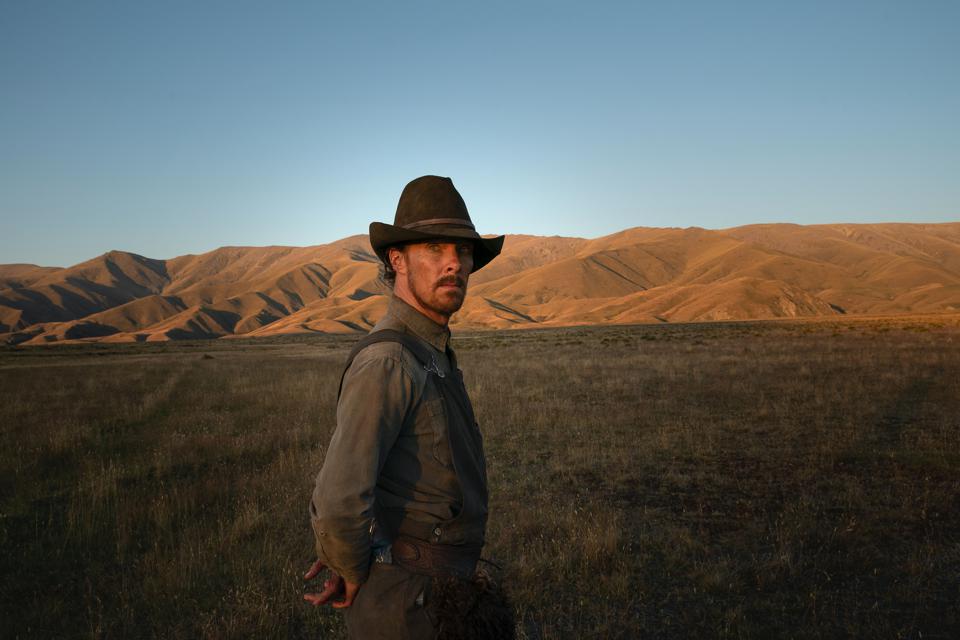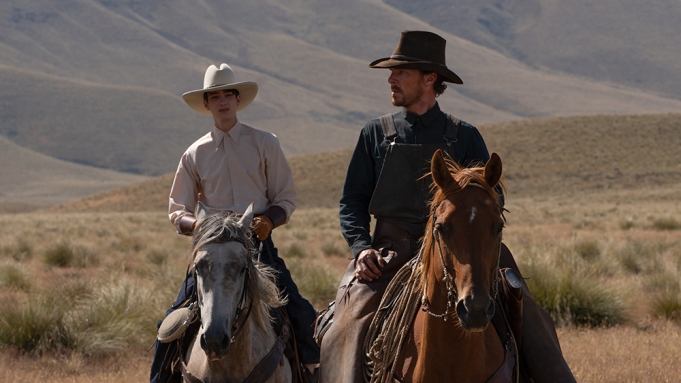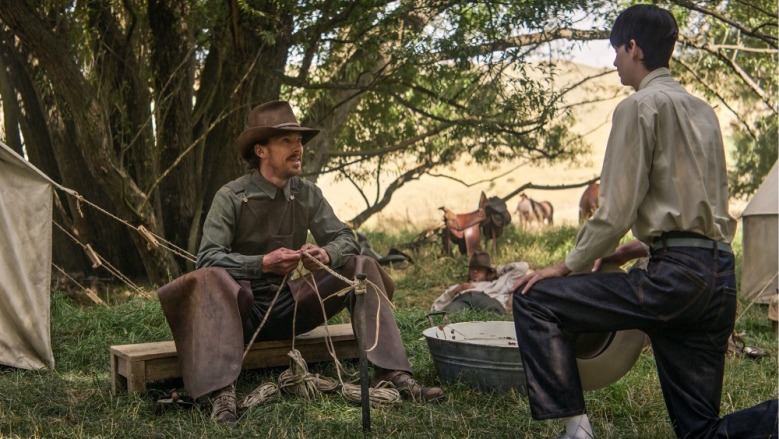Power of the Dog explained—what happens between Peter and Phil at the end?
What happens at the end of Power of the Dog? The Oscar frontrunner’s ending has got people asking questions…


If you haven’t yet watched Power of the Dog, the slow-burning Western predicted to sweep the Oscars 2022 this weekend, you might want to look away now because we’re about to unpack what the ending means.
The Power of the Dog is the ambitious Netflix film from acclaimed director Jane Campion, who delivered a gothic, subtle, chilling Western.
The film follows the domineering and cruel Phil Burbank, a rancher in Montana who inspires awe and fear in equal measure from those around him.
While Phil might be a master at ranching, he torments those around him including his brother, George (Jesse Plemons), his brother’s new wife Rose (Kirsten Dunst) and her son Peter (Kodi Smit-McPhee).
*Warning—spoiler's ahead*
As the story unfolds, viewers realize all isn’t what it seems with any of the characters. Exploring themes of repressed homosexuality, love, grief, jealousy, secrecy and masculinity, everyone goes through some sort of journey—everyone feels the power of the dog.
But just what does all of that actually mean? Let’s explore the film’s ending and what Jane Campion has said about the meaning of the power of the dog…
Sign up for the woman&home newsletter
Sign up to our free daily email for the latest royal and entertainment news, interesting opinion, expert advice on styling and beauty trends, and no-nonsense guides to the health and wellness questions you want answered.
Power of the Dog ending explained
To explain the ending, some context needs to be applied first.
Phil Burbank (Benedict Cumberbatch) spends most of the film snarling away at his new sister-in-law and her son, Peter. However, he eventually takes the young boy under his wing.
As the two bond, Phil begins to make a lasso for the effeminate Peter and the two work late into the night together.

While working on a lasso into the night at the barn, Peter questions Phil about his relationship with his late cowboy mentor, Bronco Henry. Phil recalls an occasion when he and Henry huddled together for warmth in freezing weather, Peter asks if they were naked. Phil doesn’t answer, hinting at his repressed homosexuality.
This is also highlighted when Peter finds pulp magazines belonging to the late Henry, hidden away in Phil’s secret hiding place.
These pulp magazines imply homosexuality as they are the equivalent of soft male porn for that time, with images of oiled and muscled bodybuilders.
After their conversation late into the night, the next morning Phil doesn’t make it down to breakfast and is found incredibly sick in bed.

After being rushed to the nearest hospital, it turns out Phil dies. After the funeral, a doctor tells his brother that Phil died from anthrax poisoning. While his brother concedes that anthrax was used on the farm, a pro rancher like Phil wasn’t likely to have accidentally ingested it.
It is here we see Peter, wearing gloves, handling the completed lasso Phil was working on, and placing it under his bed.
Peter then reads the bible verse Psalm 22:20, "Deliver my soul from the sword; my darling from the power of the dog." As he does, the camera pans out on Rose and George, visibly happier than they’ve been for the duration of the film when they had to contend with Phil’s torment.
So, did Peter kill Phil in Power of the Dog?
Though it isn’t spelled out explicitly, the implication is that Peter did in fact poison Phil.

It’s likely Peter—who is shown throughout the film to be interested in science—found a way to poison Phil with anthrax through a wound he got on his hand.
Peter is also implied to have the capacity to be cold-blooded as he is shown earlier in the film to have murdered and dissected a pet rabbit, under the guise of studying the anatomy.
Does the Power of the Dog book have the same ending?
The Power of the Dog is based on Thomas Savage's 1967 novel of the same name, and the film’s ending is pretty faithful to the original text.
If anything, the film’s ending is more ambiguous than in the novel. The novel ends describing a medical book being open on Peter’s desk, open on the page explaining the definition of anthrax.
What is the power of the dog?
As previously mentioned, the power of the dog refers to a passage from the Bible; Psalm 22:20, "Deliver my soul from the sword; my darling from the power of the dog."
When discussing the themes of the story, Jane Campion told Indiewire that she sees the meaning as “a kind of warning.”
“The power of the dog is all those urges, all those deep, uncontrollable urges that can come and destroy us, you know?”
The Power of the Dog is available to stream on Netflix

Jack Slater is not the Last Action Hero, but that's what comes up first when you Google him. Preferring a much more sedentary life, Jack gets his thrills by covering news, entertainment, celebrity, film and culture for woman&home, and other digital publications.
Having written for various print and online publications—ranging from national syndicates to niche magazines—Jack has written about nearly everything there is to write about, covering LGBTQ+ news, celebrity features, TV and film scoops, reviewing the latest theatre shows lighting up London’s West End and the most pressing of SEO based stories.
-
 How to style leopard print according to style experts, plus 6 outfits to bring out your wild side
How to style leopard print according to style experts, plus 6 outfits to bring out your wild sideLeopard print is back, and if you've been wondering how to wear this trend, we've got the purr-fect style tips
By Antonia Kraskowski
-
 These new paint colours make choosing the right shade easy – each formulated to complement cool, diffused natural light
These new paint colours make choosing the right shade easy – each formulated to complement cool, diffused natural lightLuxury paint brand COAT has released 19 new shades, all designed to work harmoniously with the UK's blue-grey natural light
By Emily Smith